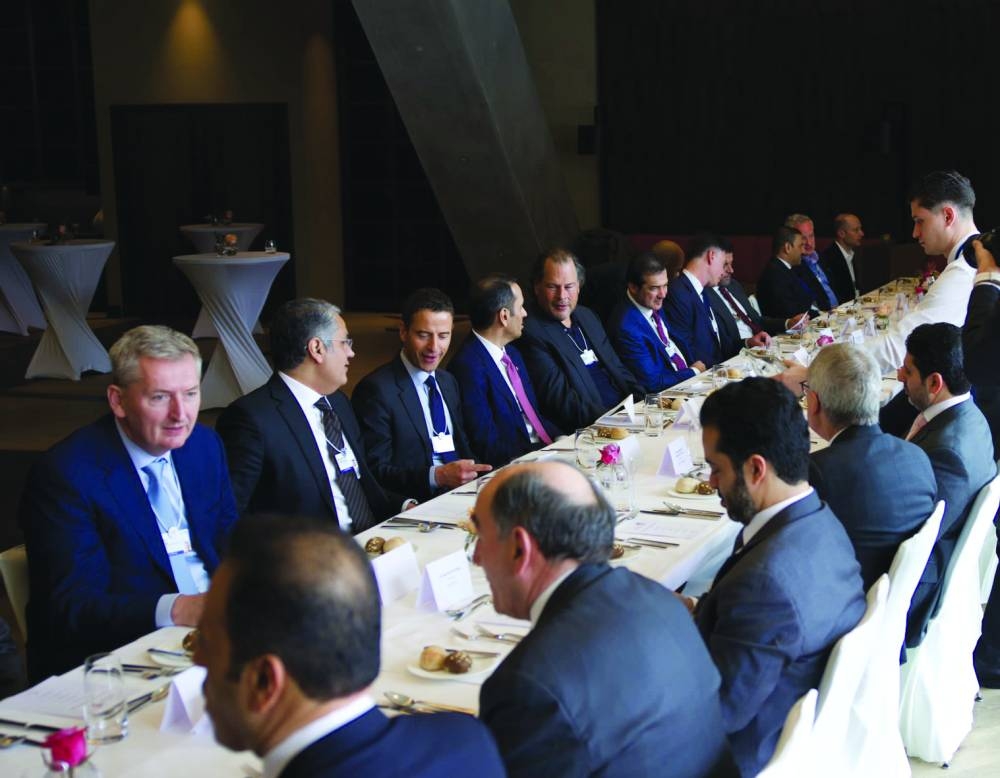HE the Minister of Communications and Information Technology Mohamed bin Ali al-Mannai has participated in the 54th session of the World Economic Forum (WEF) 2024 as part of Qatar’s delegation led by HE the Prime Minister and Minister of Foreign Affairs Sheikh Mohamed bin Abdulrahman bin Jassim al-Thani.
The event brought together various international organisations, CEOs, directors of research centres, representatives from civil society, academics, members of the international media, and young leaders from around the world.
As part of the inaugural day’s agenda, the Ministry of Communications and Information Technology (MCIT) organised a high-profile roundtable titled ‘Strengthening Actionable Intelligence from AI, Big Data, and Advanced Tech’, in partnership with the Foreign Policy magazine.
The roundtable gathered executive directors of major communications and IT companies, marketing managers, representatives from cloud companies, and experts in the fields of communications, IT, and artificial intelligence (AI). The objective was to establish a platform for leaders and innovators, showcasing Qatar’s pioneering initiatives in AI and advanced technologies.
The participants discussed how AI and machine learning (ML) could utilise big data to foster innovation. Emphasis was placed on key factors crucial for data collection and the provision of essential tools for safe access. Presenters introduced novel ideas regarding the role of technology in shaping international relations, emphasising the eagerness to embrace AI and highlighting the significance of data governance as a foundational pillar. The dialogue also encompassed strategies for harnessing technology to strengthen cooperation and generate future investment opportunities.
To extract deeper insights from the discussions and lay a robust foundation for the formulation of global AI policies and the identification of optimal worldwide applications, Foreign Policy magazine is set to release a comprehensive report on the outcomes of the collaborative dialogue session with MCIT.
On the second day, a panel discussion was held focusing on the Third Qatar National Development Strategy 2024-2030. The discussion was led by HE the Prime Minister, and HE al-Mannai and several other ministers participated in the panel discussion. They discussed Doha’s preparations to host the Web Summit and outlined the city's strategy to ensure the summit's success.
Al-Mannai emphasised MCIT’s commitment to the National Development Strategy, highlighting the upcoming introduction of the Digital Agenda 2030. This strategy aims to advance government services, boost innovation capabilities, enhance the digital business landscape, facilitate improved data exchange among government entities, and offer best practices in artificial intelligence technologies for both the government sector and businesses.
Al-Mannai said: “As part of our efforts to reach the goals of Qatar National Vision 2030 and the Third National Development Strategy, which focuses on harnessing advanced technology to achieve sustainable development and diversification of the economy, we are committed to digital innovation in infrastructure, government services, and supporting start-ups to enrich their role in the national economy.”
The minister also emphasised the importance of the technology sector in achieving the goals of the National Development Strategy as a supportive sector through training personnel, creating suitable conditions for start-ups, and enhancing the technological infrastructure in the country using advanced technologies.
On the sidelines of the forum, al-Mannai engaged in a series of meetings with leaders and CEOs in the telecommunications, IT, and business sectors. The ministry’s delegation also actively participated in various sessions on the technology sector development and lectures that discussed topics related to enhancing the business environment to create investment opportunities in a manner that contributes to boosting AI capabilities and diversifying strategies in the production of smart applications serving various fields.
Al-Mannai stated: “Qatar holds a distinctive position that qualifies it to play an active role in the future knowledge-based economy. MCIT is working to prepare an investment environment favourable to businesses and diversify the digital economy. Participation in the World Economic Forum in Davos has provided an opportunity to exchange views and discuss new ideas that contribute to enhancing our experiences and paving the way for future visions that improve data exchange while strengthening digital capabilities.”
The MCIT’s involvement in the World Economic Forum extended to three working groups. The first, the AI Governance Alliance, seeks to bring together industry leaders, governments, academic institutions, and civil society organisations to address emerging challenges in generative AI systems.
The second group, the Defining and Building the Metaverse Initiative, aims to establish standards for secure economic transformation, while the third group, represented by the Global Collaboration Village initiative, focuses on the tangible impacts of virtual collaboration, stimulating collective efforts to address global challenges.

HE the Minister of Communications and Information Technology Mohamed bin Ali al-Mannai during one of the meetings during the World Economic Forum 2024.
